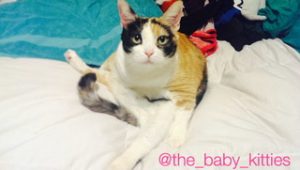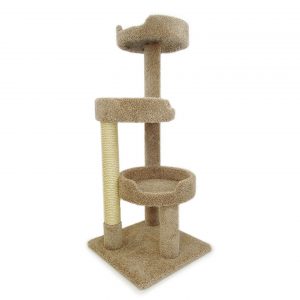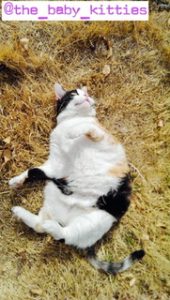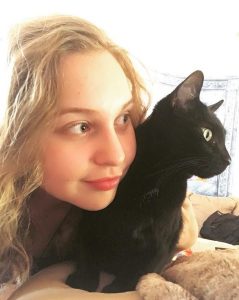Have you ever watched your furry feline run across the room, pounce onto a chair and stare at you with their big eyes? How about, walking around a corner and seeing them jump into mid-air because they didn’t expect to be noticed as they followed you? I’m sure the answer is yes. Cats are curious, active and playful, whether they are only indoor or outdoor pets. If you have ever tried to leave the house and your kitty tries to sneak out, it’s not to run away, it’s to explore! Ever heard of cats carpooling? Some cats love to go on car rides with their owners and watch the scenery! Cats have long lifespans; some can even live up to twenty years. And it’s important to keep their minds bright and quick as they age. It doesn’t happen immediately; it is a slow and gradual effect that you will start noticing after a few years. Just like us, our feline friends can’t always stay young.
Your Aging Cat
As a cat becomes elderly, mental and physical changes take place. Brain cells can diminish and the brain size can decrease, particularly in the frontal cortex. Dopamine levels decline as well, and synapses and receptors are reduced. Symptoms of aging can include: a change in waking and sleeping cycles; defecation or urination outside their litter box; less interplay with other pets and their owners; less of a desire to eat; confusion about their surroundings; and very loud crying.
One of my best friends is a cat; her name is Missus. She was first given to me when I was eight years old, and almost fourteen years later, she is still around and is one of the best cats I have ever owned. As a kitten, Missus was very intelligent! She would open kitchen cabinet doors and drag knit hats and toys into the corner of the cabinets to make a bed for herself. My mother and I would search the house for her, only to find that she had made herself a comfortable hiding spot. She was trained to walk on a leash at a young age, and with a bit more training she learned the hand signals for stop and walk. When she was angry, she would kindly let me know by walking past me, growl, look sternly into my eyes, and be on her way. And when Missus was hungry for a snack, she would jump on her back legs and pat me with her soft paws.
As she aged, some of these behaviors changed, and others have disappeared entirely. I first noticed a difference in her behavior when she became disorientated during the day. Missus also become extremely irritable and disregarded me when I would tell her “no”. It was not until she began regularly urinating on our kitchen countertops that her Dad and I decided to take her to the veterinarian. I initially thought she may have had a kidney infection, but that was not the case. At eleven years old, she was diagnosed with Dementia, and though it was heartbreaking, her Dad and I decided to try to keep her comfortable and happy. Missus prefers to be carried on walks now rather than walking herself, sometimes she pees on the countertops, and at times she is confused or anxious of her whereabouts even though she’s lived in the same house with me for years. It is difficult to accept when your furry loved one is aging, but it’s not hard to adjust your cat’s life to keep them happy, safe, and loved.
Here are six practices to keep your cat witty and fast, even in their older years:
Keep a Scheduled Routine of Playtime
Kittens love to play, and so do cats, especially when it is with their owner(s). It does not matter if you have bought a new Chewbacca Mouse cat toy, or if you run from them and hide behind corners, or drag string around on the ground. No matter what, your cat is going to have a blast playing with you!
Teach them Tricks
You can teach a cat tricks the same way you can teach a dog. You can teach them how to give high-fives, to sit, to climb, and much more. Just remember to practice, reward your kitty with a special treat, and move on to a new trick when they’ve successfully learned one.
Looking for Dinner? Make it a Scavenger Hunt!
Get your cat’s hunter instincts activated by placing clues (treats) along the way to your cat’s dinner. If you place treats from the floor, to the couch and their cat trees, and they’ll be more energetic and curious as to where they’re being led. Make it a fun puzzle for them! It is safer than to allow your cat to hunt for mice or birds; this way you can avoid your cat catching any diseases or parasites. And you can take this opportunity to teach your cat some tricks, and reward them with a scrumptious dinner afterwards.
Go on Walks
Physical exercise is just as important for kitty minds as it is for ours. Your cat will be thinking more and will be engaged with their surrounding environment in different ways. If your cat is an indoor pet, they will love the opportunity to chew on grass, watch birds fly in the sky, smell new things, and watch bugs crawl across the ground! Their confidence will also increase as they become used to routine walks.
Get or Make a Cat Tree
Your kitty will love the ability to climb and see their world at a higher view. Not only will the exercise of jumping help your cat, it will also give them a place of safety where they can relieve stress by stretching on the tree and by building their territory.
Visual Stimulants
Place your cat on the inside of your window ledge, and let her/him watch the outside world. It is their version of television! If you have a screen you can open the window and let them press their faces against it as they watch the leaves flutter in the breeze. You could even purchase a bird feeder to pace near the window so your feline can watch and imagine hunting sparrows or humming birds!
When to Take Further Steps
If you noticed inappropriate spraying outside the little box(es), a difference in your cat’s sleep schedule, hostile behavior while in a familiar environment, or extreme confusion for your cat, it’s definitely time to take them to the veterinarian. According to the American Association of Feline Practitioners, about fifty percent of cats at fifteen years old start showing signs of brain aging. Keep in mind that it’s important to take your senior kitty to the veterinarian once a year, or more, to make sure their overall health is doing well.
Remember to keep your cat comfortable, and have a stable routine for him or her. If you are interested in medications for your aging kitty, there’s Anipryl (also goes under the name of L-Deprenyl and Selegiline). It is approved by the FDA to treat cats with Cognitive Dysfunction. Antidepressant could be prescribed to lower serotonin in your kitty’s brain. If you prefer a holistic method, you could buy supplements such as: antioxidants; Vitamin C and E; Fish Oils with Omega 3; Beta Carotene; and L-Carnitine to improve your cat’s cognitive abilities. Talk to your vet if you are interested in any of these medications and supplements.
For myself, I have chosen to keep a steady routine and use a natural approach toward Missus and her aging. She has her personal space, sleeps with a crystal salt lamp nearby, and when she comes to socialize with her Dad or I, we give her lots of love. Missus is also on a steady dose of Nature Made Fish Oil with Omega 3 that is mixed into her meals, with Spectrum Organic Coconut Oil, and Spring Valley Vitamin E. From all the tips above, it is most important to have a routine for your aging cat. Need an example? Try something like this:
Breakfast: 8:00 a.m. Playtime: 10:30 a.m.
Lunch: 12:30 p.m. Walk/Outside Time: 2:30 p.m.
Training with Treats: 4:30 p.m. Dinner: 6:00 p.m.
Bedtime: 9:00 p.m.
It will feel like a lot of work, but your kitty will benefit from a routine that they will become comfortable with and can be familiar with. I bet you’re wondering if all of this works. I guarantee, from a lover of cats and as the Mamma of Missus, I have seen big improvements from when she was first diagnosed three years ago with Dementia. Sometimes are not as easy, but she is happy, and so are we.
Keep a routine, play with them, and of course, always include lots of snuggles and love for your kitty.
Make sure to check out my cat’s Instagram page for updates on Missus, Baby Kitty, and Fredrick Douglass!
Elanda-Isabella Atencio, our Feline Editor, is on her road to being a “crazy” cat lady. She has three cats; a moody Missus, a wild Baby Kitty, and notorious Fredrick Douglass. She was raised with cats, chickens, dogs, and geese. From cleaning coops, morning dog runs, picking eggs, to growing catnip, Elanda enjoys pampering her pets. Elanda is a student at New Mexico State University, earning her BA in Creative Writing and is Editor-in-Chief of the online arts journal, Independent Noise and reader for Puerto del Sol. She plans to move to Oregon, where she hopes to take her cats on daily walks when it’s overcast and cool. If you’d like to contact Elanda, email her at eincatencio@gmail.com.







